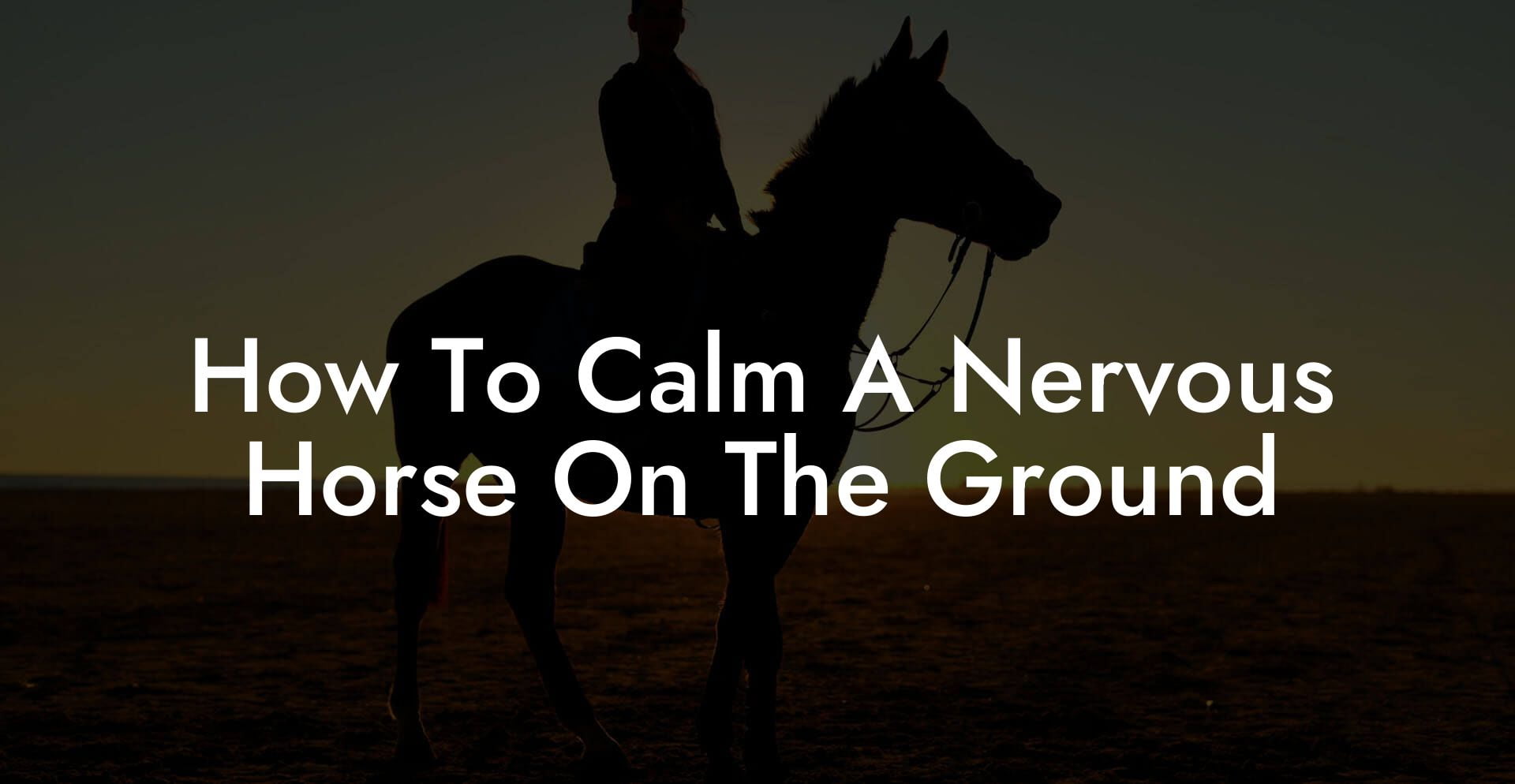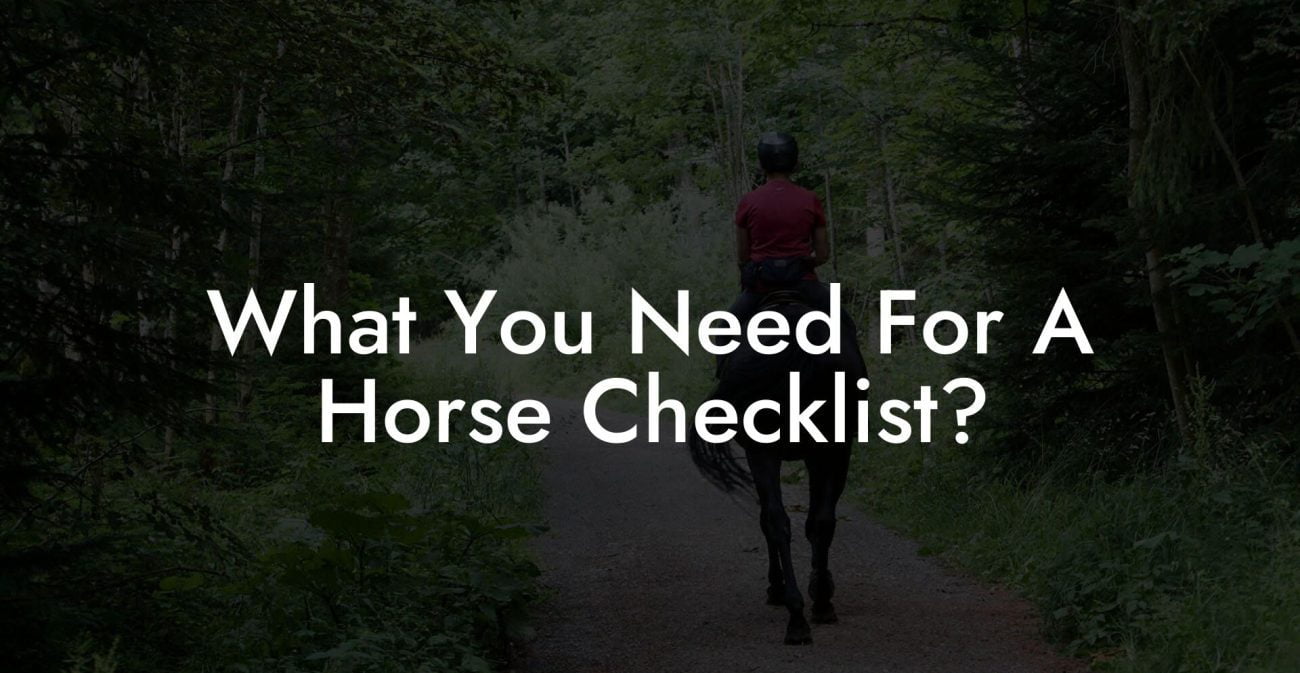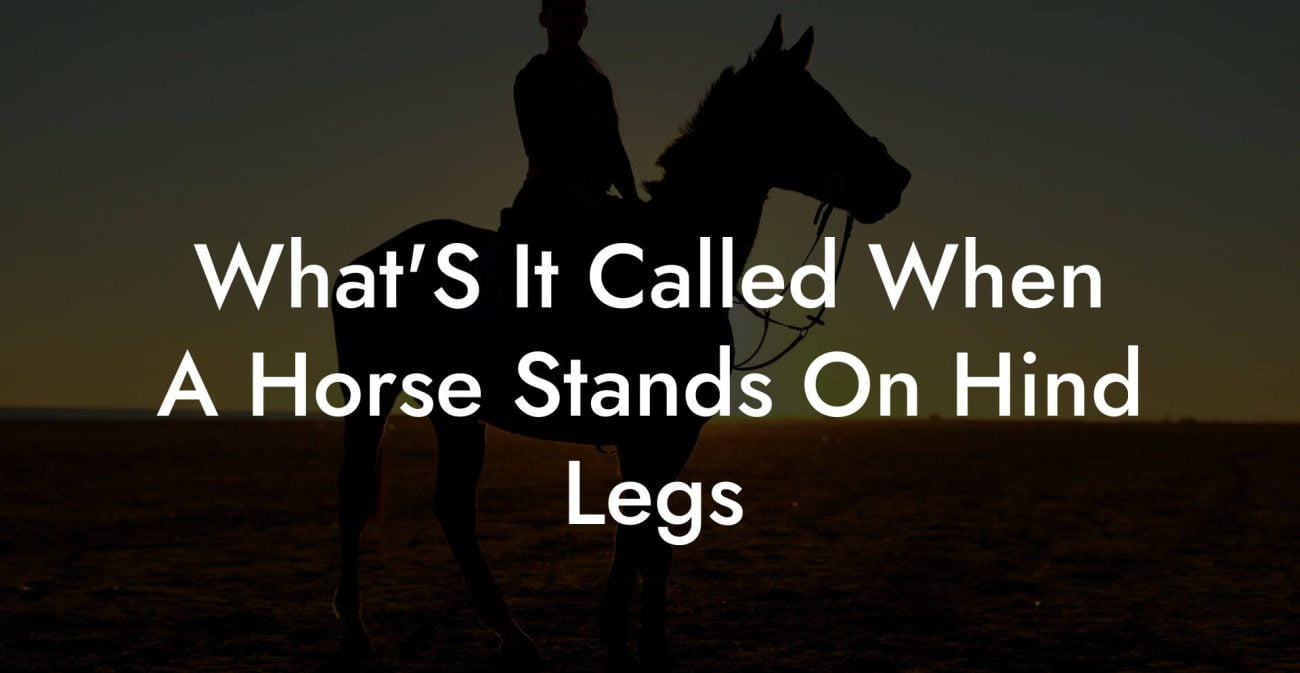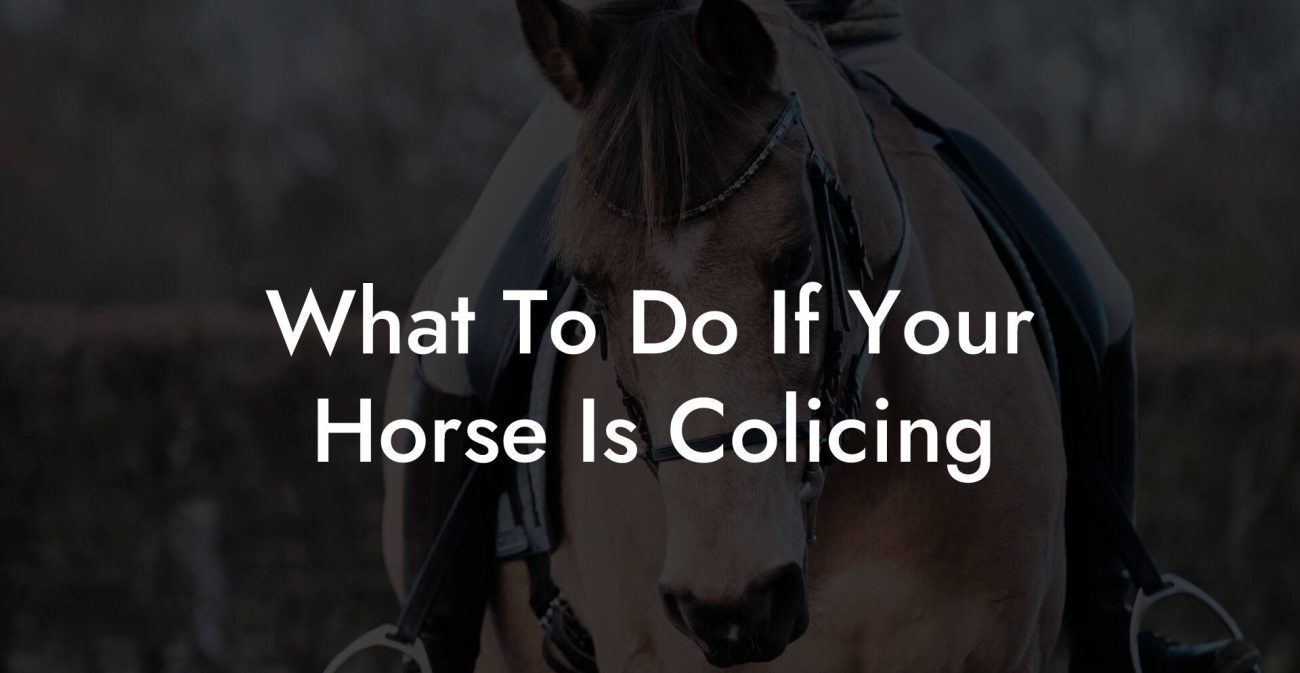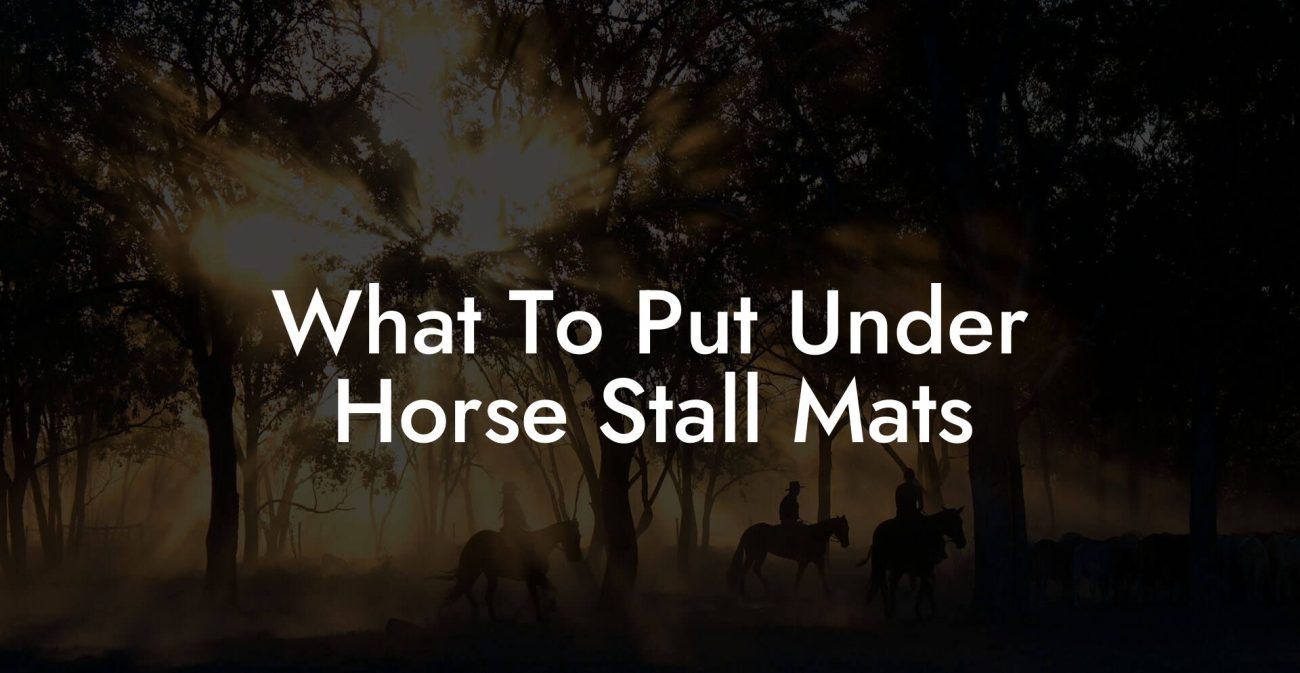Ever tried comforting a jittery horse that’s acting like it just spotted a ghost in the stable? Trust me, calming a nervous horse on the ground is like mastering the art of chill in a world that moves at a million miles per hour, especially when your equine friend is giving you all the mixed signals. Whether you're a seasoned horse whisperer or a Gen-Z newbie dipping your toes into horse care, this guide is your ultimate playbook for transforming anxious equine energy into calm, collected vibes.
Quick Links to Useful Sections
- Understanding the Nervous Horse: The Equine Psyche Unbridled
- Why Do Horses Get Nervous on the Ground?
- Recognizing the Signs of a Nervous Horse
- The Science Behind Equine Anxiety
- Step-by-Step Techniques to Calm a Nervous Horse on the Ground
- 1. Approach with Patience and Presence
- 2. Use Gentle, Consistent Touch
- 3. Employ Calming Voice and Body Language
- 4. Create a Calm Environment
- 5. Utilize Positive Reinforcement
- 6. Gradual Desensitization
- Harnessing the Power of Routine and Consistency
- The Role of nutrition and Environment in Equine Calmness
- Holistic and Complementary Approaches to Equine Calming Techniques
- Aromatherapy and Essential Oils
- Herbal Remedies
- Massage and Acupressure
- Developing a Bond: Building Trust with Your Nervous Horse
- Mental and Behavioral Techniques: The Horse Whisperer’s Toolbox
- Controlled Exposure Exercises
- Behavioral Conditioning
- Distraction and Engagement
- Integrating Modern Technology in Calming a Nervous Horse
- Wearable Monitors and Apps
- Virtual Reality and Simulation
- Resources and Community Support: Your Next Steps
- Real-Life Success Stories: When Horses Embrace Calm
- Case Study 1: Bella’s Journey from Panic to Peace
- Case Study 2: Max’s Transformation Through Trust-Building Techniques
- Case Study 3: Serenity in the Stable: From Chaos to Connection
- Creating Your Personalized Calming Plan for Your Horse
- Step 1: Detailed Observation and Assessment
- Step 2: Set Clear, Measurable Goals
- Step 3: Combine Multiple Calming Techniques
- Step 4: Consistency is Key
- Step 5: Continuous Monitoring and Adjustment
- Integrative and Holistic FAQs: Your Top Questions Answered
- Your Journey to a Calm and Confident Equine Companion
Understanding the Nervous Horse: The Equine Psyche Unbridled
Horses are majestic yet highly sensitive creatures. As prey animals, they are naturally wired to be alert to potential threats, from rustling leaves to an unexpected shadow. When your horse acts nervous on the ground, it might be reacting to an overload of sensory information, unfamiliar surroundings, or simply the stress of isolation from its herd.
The nervous energy you see is their way of saying, “Hey, something’s off!” But understanding why your horse is anxious requires a deep dive into their behavior, body language, and the underlying environmental triggers. In the same way that you might get jittery before a big exam or performance, your horse’s nervous behavior is a survival mechanism, tuned into even the slightest hint of danger.
In this section, we’ll explore the equine brain, examine the subtle signs of nervousness, and set the stage for effective calming techniques that tap into the deep connection between humans and horses.
Why Do Horses Get Nervous on the Ground?
It’s not just about the wind whispering secrets through the barn rafters; a variety of factors can tip your horse into anxious behavior. Here are some key reasons:
- Environmental Stressors: Loud noises, sudden movements, or the mere presence of unfamiliar people and animals can send a horse’s adrenaline skyrocketing.
- Separation Anxiety: Horses are herd animals. When isolated from their companions, they can quickly become stressed and unsettled.
- Past Experiences: Negative experiences such as rough handling, previous trauma, or even misinterpreted cues in training can leave lasting impressions.
- health Concerns: Pain or discomfort from an injury, illness, or dental issues may also manifest as nervousness on the ground.
- New Surroundings: Whether it’s a move to a new stable or an unfamiliar arena, any change in environment can unsettle your horse.
Recognizing these triggers is the first step in your journey to de-escalate your horse’s anxiety. After all, when you know what sets off the nervous energy, you can tailor your approach to ensure your horse feels safe and secure.
Recognizing the Signs of a Nervous Horse
A calm horse has a relaxed posture, soft eyes, and steady breathing. On the contrary, a nervous horse on the ground might display:
- Tense Muscles: Stiffening of the neck, shoulders, and legs is a clear indicator that your horse is on high alert.
- Restless Behavior: Pacing, shifting weight from one leg to another, or excessive pawing can all signal anxiety.
- Elevated Heart Rate: This is often noticeable if you get a chance to place your hand gently on their shoulder; a rapid pulse might betray their inner stress.
- Wide-Eyed Look: A horse that is nervous often has eyes that are wide open, scanning the environment for threats.
- Excessive Vocalization: Whinnying or snorting can be an attempt to communicate distress or alert others to the perceived danger.
Getting familiar with these signs can help you intercede early, setting the stage for a tailored approach to easing your horse’s mind and muscles.
The Science Behind Equine Anxiety
Let’s geek out for a second: the equine brain is a complex network similar in many ways to our own, though it operates with horse-specific nuances. The amygdala, the brain's emotional center, plays a key role in processing fear. When a potential threat is detected, this area fires up, triggering the body’s stress response.
Stress hormones like adrenaline and cortisol flood your horse’s system, priming them for a “fight or flight” response. While this reaction can be life-saving in the wild, in a controlled environment like your stable, it can lead to unnecessary tension and even hinder the bond between you and your horse.
Armed with this knowledge, you can implement strategies that not only soothe their physical symptoms but also ease their mental state. Think of it as a two-pronged approach: calming both the mind and body for a complete relaxation experience.
Step-by-Step Techniques to Calm a Nervous Horse on the Ground
Ready to roll up your sleeves and get into the nitty-gritty of calming techniques? Here are some proven methods that have helped countless equestrians create a peaceful atmosphere for their jitters-prone horses.
1. Approach with Patience and Presence
The first order of business is to put yourself in the right headspace. Horses are hyper-aware of our energy, so it’s crucial to remain calm and centered. Take a few deep breaths, relax your shoulders, and adopt a non-threatening body language. Walk slowly toward your horse, avoiding sudden moves.
Remember, you’re not just a handler, you’re a source of reassurance. Maintaining eye contact (without staring intently) and offering soft, soothing words can communicate safety. If you're feeling your own jitters, your horse will pick up on that, so unleash your inner zen!
2. Use Gentle, Consistent Touch
Physical touch can be incredibly reassuring when done thoughtfully. Begin by extending a relaxed hand for your horse to sniff. When they do, gently scratch along the neck or shoulder, areas where horses typically enjoy being touched.
If your horse remains resistant or jumps back, don't force physical contact. Instead, give them space and allow them to come to you. Consistency is key, regular, gentle interactions build trust over time.
3. Employ Calming Voice and Body Language
Your voice is a powerful tool. Speaking in a soft, rhythmic tone can serve as a cue for your horse to relax. Avoid loud, sharp commands which may be perceived as threats, and instead, speak in a cadence that mirrors the natural flow of a lullaby.
Complement your voice with relaxed body language. Keep your movements slow and deliberate, steering clear of abrupt gestures. The more harmonious your energy, the more likely your horse will mirror your calm.
4. Create a Calm Environment
A serene setting can significantly reduce your horse's anxiety. Dim the lights in the stable, eliminate harsh noises, and if possible, play some soft, ambient music, think lo-fi beats or nature sounds. The right environment acts as a cocoon, enveloping your horse in a safe space.
Additionally, ensure that the ground where your horse stands is clean and free from hazards. A tidy, familiar setting can anchor their focus away from potential stressors.
5. Utilize Positive Reinforcement
Every time your horse shows signs of relaxation, reward them. This could be in the form of a gentle pat, a soothing word, or even a treat if appropriate. Positive reinforcement reinforces the behavior you’re trying to encourage, creating a feedback loop of trust and calmness.
Over time, your horse will associate these peaceful moments with a sense of security, making them less likely to spiral into panic when faced with stressors.
6. Gradual Desensitization
If your horse’s nervousness is triggered by a specific stimulus, be it a particular noise or movement, gradual desensitization can work wonders. Start by introducing the trigger at a very low intensity and gradually build up as your horse becomes more comfortable.
For example, if your horse is spooked by the sound of a trailer backing up, begin by playing a very soft recording of the sound from a distance. Slowly increase the volume and proximity over several sessions, always pairing the experience with calming reassurances.
This systematic exposure helps your horse learn that there’s no real danger, effectively neutralizing the trigger over time.
Harnessing the Power of Routine and Consistency
One of the golden rules of equine care is consistency. Horses thrive on routine, and a predictable schedule can be incredibly comforting for a nervous horse. Establishing a daily routine that includes regular feeding times, grooming sessions, and exercise not only builds trust but also creates a structured environment where your horse feels secure.
Integrate these routines with moments dedicated solely to relaxation. Think of it as the equine equivalent of your favorite mindfulness app session. Whether it's a quiet moment in a padded stall or a gentle grooming session in a familiar paddock, these predictable experiences become anchors of calm in an otherwise unpredictable world.
Over time, as your horse begins to rely on this consistent routine, the anxiety of the unknown diminishes, and trust grows stronger, both in you and in their own ability to remain calm.
The Role of nutrition and Environment in Equine Calmness
While emotional support is paramount, don’t underestimate the impact of nutrition and a wholesome environment on your horse’s overall demeanor. Just like us, horses benefit greatly from a balanced diet that supports optimal health and stress management.
Consider incorporating feeds rich in natural vitamins and minerals, and consult your vet about supplements that may promote a calmer temperament. Omega-3 fatty acids, found in flaxseed and certain types of hay, can improve neurological function and reduce anxiety. Additionally, access to clean, fresh water at all times is essential.
The stable environment itself should be a sanctuary. Ensure that your horse’s living area is well-ventilated, safe, and free from clutter. A soothing color palette, natural lighting, and even access to a quiet outdoor space can all contribute to lowering stress levels.
Remember, a nourished body supports a calm mind. By aligning your horse’s diet with their emotional needs, you’re investing in a more serene, balanced companion.
Holistic and Complementary Approaches to Equine Calming Techniques
For those open to holistic avenues, blending traditional calming methods with natural remedies can be a game-changer. Integrating complementary therapies can transform your approach, providing a well-rounded strategy to support your horse’s mental and physical well-being.
Aromatherapy and Essential Oils
Essential oils aren’t just for humans, many horse owners swear by their calming properties. Scents like lavender, chamomile, and valerian have been used to soothe anxiety in horses. Diffusing these oils in the stable or applying them in a safe, diluted form (always consult a vet first) can create a serene atmosphere that promotes relaxation.
Herbal Remedies
In addition to essential oils, herbal remedies such as passionflower, lemon balm, and magnesium supplements have been shown to help ease tension. These herbs can be administered as teas, tinctures, or food additives after checking with your equine nutritionist. The goal is to naturally support your horse’s nervous system.
Massage and Acupressure
Much like in human wellness practices, massage therapy isn’t just a luxury, it can be essential for releasing built-up tension in your horse. Gentle massages, focused on the neck, back, and shoulders, can help alleviate tight muscles and improve circulation. Acupressure techniques, employed by experienced equine therapists, stimulate specific points to restore energy balance and promote calm.
These holistic therapies, when combined with traditional handling techniques, create an integrative approach that addresses both the physical and emotional aspects of your horse’s anxiety.
Developing a Bond: Building Trust with Your Nervous Horse
At the heart of calming a nervous horse is the art of building a genuine connection. Horses are incredibly intuitive and can sense trust, or the lack thereof, in their handlers. Establishing a strong, respectful bond is fundamental to creating a safe space for your horse.
Start with time. Let your horse approach you on their own terms. Whether it’s spending quiet moments in the paddock together or engaging in gentle grooming sessions, each interaction adds another layer to the foundation of trust.
Be consistent in your interactions and always respect your horse’s cues. If they show signs of discomfort or retreat, give them space and try again later. Over time, that patient persistence translates into a deep, reciprocal trust where your presence becomes synonymous with safety and comfort.
Mental and Behavioral Techniques: The Horse Whisperer’s Toolbox
Beyond physical approaches, addressing your horse’s nervous energy also involves mental and behavioral techniques. Here are some creative strategies to help shift their mindset:
Controlled Exposure Exercises
Gradually expose your horse to mildly stressful stimuli in a controlled environment. For instance, if your horse is uneasy around water, start by leading them to a calm, shallow puddle rather than a full-blown pond. The incremental exposure allows them to acclimate to the presence of water without triggering panic.
Behavioral Conditioning
Employ techniques such as clicker training or positive reinforcement to reward calm behavior. Each time your horse remains relaxed despite a potential stressor, provide them with a treat or gentle praise. Over repeated sessions, this conscious conditioning retrains their instinctual responses.
Distraction and Engagement
Sometimes, diverting a nervous horse’s focus can work wonders. Use interactive toys, engaging games, or even a favorite treat to distract them from what’s triggering their anxiety. This not only shifts their focus but can often break the cycle of nervous anticipation.
These techniques tap into the underlying psychology of behavior, training your horse to naturally pivot from a state of alertness to one of calm attentiveness.
Integrating Modern Technology in Calming a Nervous Horse
In a world driven by innovation, technology isn’t just for smartphones and smart homes, it’s making its way into the stables too. Modern tech tools can enhance your horse calming strategies, making them more effective and measurable.
Wearable Monitors and Apps
Equine-specific wearable monitors can track your horse’s heart rate, movement, and stress levels in real-time. Paired with smartphone apps, these devices give you valuable insights into when your horse is most anxious and how effective your calming techniques are.
Imagine syncing your horse’s data with your calendar to schedule calming sessions at peak stress times. With such insights at your fingertips, you can fine-tune your approach to ensure maximum comfort.
Virtual Reality and Simulation
While it might sound futuristic, virtual reality simulations are beginning to be explored as a way to expose horses to controlled stimuli. Using immersive environments, trainers can gradually introduce stressors in a safe, repeatable manner, accelerating the desensitization process.
Integrating modern technology not only modernizes your approach but also appeals to tech-savvy Gen-Z and millennial equestrians who are keen to blend tradition with innovation.
Resources and Community Support: Your Next Steps
You’re not in this alone. The journey to calm a nervous horse is one best traveled with community support and expert guidance. From online forums to local equine groups, countless resources exist to help you refine your skills and share experiences.
Look into local equine behaviorists who offer workshops or one-on-one training sessions. Social media platforms like Instagram, TikTok, and dedicated horse care blogs are invaluable for daily tips, success stories, and even humorous anecdotes that remind you that every horse has its quirks.
Consider joining a community center or an equestrian academy that emphasizes not only the physical aspects of horse care but also the emotional support both you and your horse need. Peer support can provide fresh insights, from tried-and-true calming techniques to innovative methods that you might never have considered.
By tapping into these resources, you not only become a better horse caregiver but also join a vibrant community of like-minded individuals who are passionate about creating compassionate, calm, and connected equine environments.
Real-Life Success Stories: When Horses Embrace Calm
Nothing illustrates the power of these techniques better than real-world success stories. Let’s dive into a few transformative journeys that showcase how patience, perseverance, and a holistic approach have turned nervous horses into calm, confident companions.
Case Study 1: Bella’s Journey from Panic to Peace
Bella, a sprightly mare known for her skittish behavior, used to bolt at the slightest sound. Her owner, frustrated yet determined, embarked on a mission to transform Bella’s anxiety. Starting with gentle, slow-paced interactions and gradually introducing her to the familiar sounds of the stable, Bella began to relax. Over several months, sessions of calming music, aromatherapy, and controlled exposure to mild stressors helped Bella evolve from hysterical to harmonious. Today, Bella greets her owner with a gentle nuzzle, a testament to the power of understanding, compassion, and patience.
Case Study 2: Max’s Transformation Through Trust-Building Techniques
Max, a handsome gelding with incredible athletic potential, was plagued by nervous energy that undermined his performance. Concerned by his recurring bouts of anxiety, his trainer focused on establishing a strong bond through positive reinforcement and routine grooming sessions. By integrating technology, using a wearable monitor to track stress levels, the trainer could tweak session timings and gradually desensitize Max to usual stress triggers. The results were astounding; Max not only became calmer on the ground but also improved remarkably in competitive settings, steadily building a trust that now reflects in every stride.
Case Study 3: Serenity in the Stable: From Chaos to Connection
In a bustling boarding stable, a group of horses exhibited high levels of nervous behavior due to overcrowded conditions and inconsistent routines. A dedicated caretaker introduced a structured daily schedule complemented by meditation-like calming techniques and gentle touches. By fostering a stable environment enriched with soothing music, aromatherapy, and consistent handling, the horses gradually learned to settle. The atmosphere shifted from chaotic to serene, a living demonstration that environmental modifications, combined with trust-building measures, can revolutionize the overall well-being of your equine companions.
These stories remind us that every horse can be guided from a state of anxiety to one of peaceful equanimity with the right mix of technique, love, and persistence.
Creating Your Personalized Calming Plan for Your Horse
Just as every human has a unique way of winding down, every horse has its own set of triggers and comforts. Creating your personalized plan involves understanding your horse’s distinct needs and blending different approaches to craft a holistic calming strategy.
Step 1: Detailed Observation and Assessment
Begin by observing your horse in various scenarios. Identify the specific triggers, whether it’s an unfamiliar sound, a change in routine, or the presence of certain environments. Keep a journal to document moments of anxiety and relaxation. This detailed insight will be your roadmap to crafting a targeted intervention.
Step 2: Set Clear, Measurable Goals
Decide what success looks like for you and your horse. Is it reduced pacing, lower heart rate, or simply more relaxed behavior during routine activities? Setting clear goals helps you track the progress and adjust your techniques accordingly.
Step 3: Combine Multiple Calming Techniques
Use the methods discussed, gentle touch, desensitization, calming music, aromatherapy, positive reinforcement, and technology-based monitoring. Experiment with different combinations to see what resonates best with your horse.
Step 4: Consistency is Key
Like any skill, consistency strengthens the bond between you and your horse. Stick to a regular routine that incorporates these calming techniques. Over time, your horse will begin associating these specific methods with safety and positivity.
Step 5: Continuous Monitoring and Adjustment
Use both observational insights and tech tools to monitor your horse’s progress. Adjust your approach based on real-time feedback, and don't be afraid to tweak your plan as their comfort levels evolve. A flexible, evolving plan is far more effective than a rigid, one-size-fits-all solution.
With your personalized plan in place, you're not only taking a proactive step in managing your horse’s nervous energy but also demonstrating a commitment to their overall mental and physical well-being.
Integrative and Holistic FAQs: Your Top Questions Answered
Below are some frequently asked questions that dive deep into practical concerns about calming a nervous horse on the ground. Let these answers guide you, and remember, every horse’s journey is unique.
1. What are the first signs that my horse is nervous on the ground?
Early signs include tense muscles, restlessness, rapid breathing, wide eyes, and excessive movement. Recognizing these signs promptly is key to intervening before anxiety escalates.
2. How important is my own demeanor in calming my horse?
Extremely important! Horses are intuitive creatures that mirror your energy. Staying calm, composed, and using relaxed body language goes a long way in reassuring your horse.
3. Are there specific environmental changes that can help reduce my horse’s anxiety?
Yes, maintaining a tidy, well-ventilated, and quiet stable with soft ambient music, and even soothing colors can create a calmer environment for your horse.
4. How do essential oils and herbal remedies work for calming horses?
Essential oils like lavender and chamomile, and herbal remedies such as passionflower, can have a calming effect on the nervous system. Always consult with your vet to ensure they’re used safely.
5. Can technology really help in monitoring my horse’s stress?
Absolutely. Wearable monitors and equine health apps provide real-time feedback on your horse’s heart rate and movement, allowing you to precisely tailor your calming techniques.
6. What role does routine play in reducing a horse’s anxiety?
Routine creates predictability, which is very comforting for horses. A consistent schedule for feeding, grooming, and exercise helps them know what to expect and reduces stress.
7. How do I perform gradual desensitization with a nervous horse?
Introduce the fear-inducing stimulus in very low intensity at first, then gradually increase the exposure over time while rewarding calm behavior. This helps the horse learn that there’s no real danger.
8. Is it normal for every horse to display nervous behavior at some point?
Yes, even the most confident horses might show nervous behavior when confronted with novel or stressful situations. It’s a natural response driven by their instinct as prey animals.
9. Can a professional trainer help if my horse’s anxiety persists?
Definitely. A professional equine behaviorist or trainer can provide personalized guidance and techniques tailored to your horse’s unique needs.
10. How long does it typically take for a nervous horse to become calm?
The timeline varies based on the individual horse and the techniques used. With consistent effort and the right strategy, many horses show significant improvement within a few weeks to several months.
Your Journey to a Calm and Confident Equine Companion
Transforming a nervous horse into a calm, confident companion isn’t a one-day job, it’s an evolving journey that marries patience, consistency, and a healthy dose of love. Every steady heartbeat, every soft nuzzle, and every moment of mutual understanding builds a bridge between you and your majestic friend.
Embrace this journey with an open mind and heart. Every interaction, whether it’s a gentle grooming session, a quiet moment in the paddock, or even a tech-savvy monitoring session, contributes to a larger narrative of trust, compassion, and shared growth. As you apply these proven techniques and innovative strategies, you’ll notice transformative changes, not just in your horse’s behavior, but in the strength of your bond.
In your hands lies the power to create a safe haven where your horse feels understood and secure. So, step into the stable with confidence, let your calm energy permeate the space, and watch as both you and your equine companion thrive together in a harmonious balance.
Your journey to a calmer, more centered horse isn’t just about managing nervous energy, it’s about cultivating a meaningful, life-enhancing connection that stands the test of time. Embrace every challenge and celebrate every small victory. Soon, those jittery moments will transform into a symphony of serenity that resonates with both you and your trusted companion.
With every step, you’re not just calming a nervous horse; you’re pioneering a journey of empathy, modern equine care, and a bond that eclipses the ordinary. Here's to a future where every hoofbeat echoes with the confidence, trust, and tranquility that you and your horse have worked so hard to build.

